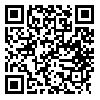Volume 12, Issue 3 (6-2012)
Iranian Journal of Medical Education 2012, 12(3): 160-166 |
Back to browse issues page
Download citation:
BibTeX | RIS | EndNote | Medlars | ProCite | Reference Manager | RefWorks
Send citation to:



BibTeX | RIS | EndNote | Medlars | ProCite | Reference Manager | RefWorks
Send citation to:
Zarei ّ, Mirhashemi M, Sharifi H. The Relationship between Thinking Styles and Academic Adjustment in Nursing Students. Iranian Journal of Medical Education 2012; 12 (3) :160-166
URL: http://ijme.mui.ac.ir/article-1-1881-en.html
URL: http://ijme.mui.ac.ir/article-1-1881-en.html
, alizarei@iaukhoy.ac.ir
Abstract: (14015 Views)
Introduction: Adjustment together with its different aspects is considered a basic and extensive issue in psychology. Therefore, identifying the related factors, while developing knowledge of the field, can help reduce individual and inter- individual problems. Hence, the aim of the present research is to investigate relationship between thinking styles and academic adjustment.
Methods: This descriptive- correlatinal study was conducted on 65 nursing students in Islamic Azad University (Khoy branch) selected through cluster sampling. To gather the data, two standard questionnaires on thinking styles of Strenberg,Wagner and Zang and academic adjustment questionnaire of Baker and Siryak were used. Data were analyzed using Pearson correlation test and multiple regression.
Results: The results of Pearson correlation test showed that there were positive, significant relations between judiciary, executive, hierarchical, liberal, external and type I thinking styles with academic adjustment, while thinking style of anarchism showed a negative and significant relationship. The results of multiple regression indicated that type I thinking styles positively and type III thinking styles negatively predict academic adjustment. In general, 20.4% of variance for academic adjustment is explicable based on the preferred thinking styles. Also the academic adjustment of nursing students was above the average.
Conclusion: There was a relationship between academic adjustment and the kind of thinking style. Also, one could predict nursing students’ academic adjustment by knowing their scores of type I and Type III thinking styles. Therefore, improvement and promotion of the academic adjustment of nursing students demands paying more attention to their type of thinking style.
Type of Study: Original research article |
Subject:
other
Received: 2011/11/23 | Accepted: 2012/02/28 | Published: 2012/06/15 | ePublished: 2012/06/15
Received: 2011/11/23 | Accepted: 2012/02/28 | Published: 2012/06/15 | ePublished: 2012/06/15
پرسشنامه مطالعه1 [DOCX 514 KB] (914 Download)
پرسشنامه مطالعه2 [DOCX 1595 KB] (907 Download)
Send email to the article author
| Rights and permissions | |
 |
This work is licensed under a Creative Commons Attribution-NonCommercial 4.0 International License. |




